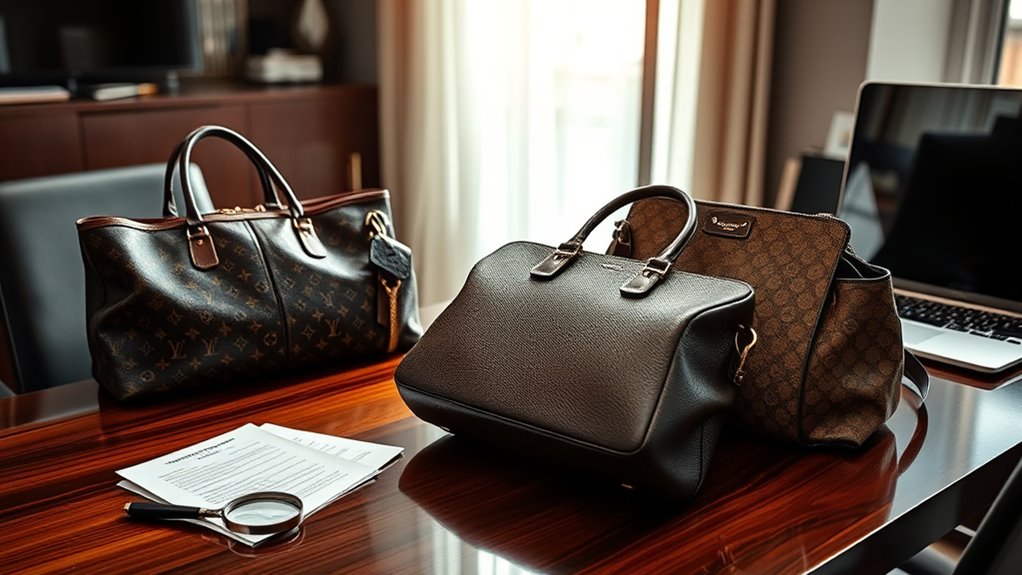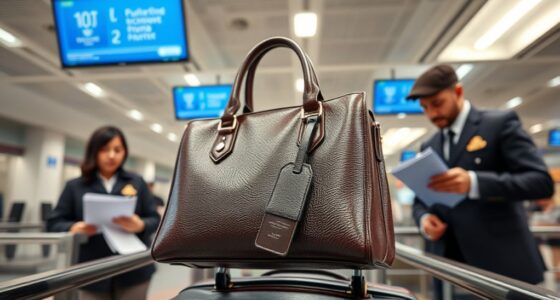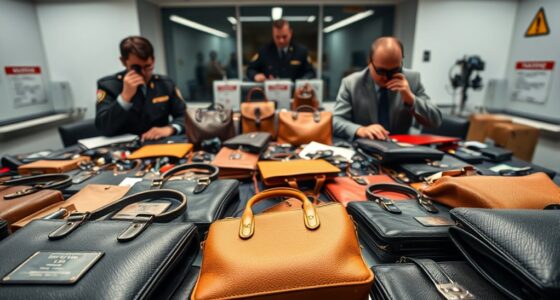To resell designer bags online legally, you need to understand intellectual property laws, including trademarks and copyrights, and verify authenticity through verified sources. Make sure you have proper licensing or authorization to sell branded items and keep detailed records and original packaging to prove legitimacy. Follow platform policies, stay updated on international import rules, and comply with local tax and business licensing laws. Continuing on will give you more tips to stay fully compliant and protect your business.
Key Takeaways
- Obtain proper licensing and resale agreements to legally sell designer bags and avoid trademark infringement.
- Authenticate products using verified services and retain documentation to prevent selling counterfeits.
- Comply with platform policies, ensuring listings meet authenticity and disclosure standards to avoid account suspension.
- Understand customs, import taxes, and international shipping regulations to legally sell in foreign markets.
- Maintain detailed records of provenance and receipts to verify authenticity and support legal resale claims.
Understanding Trademark and Copyright Laws in Reselling
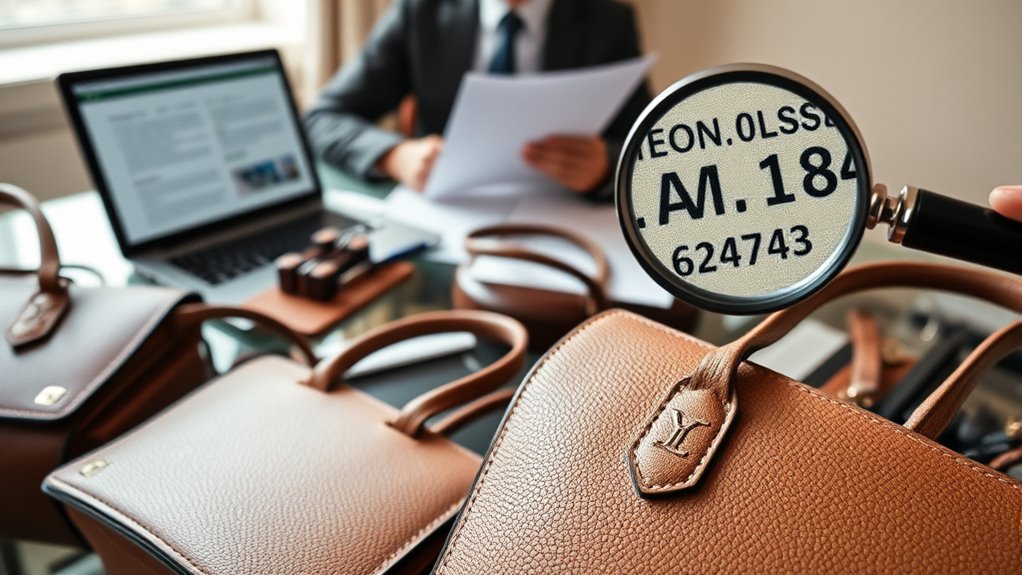
While reselling designer bags can be a profitable venture, it’s essential to understand the legal boundaries set by trademark and copyright laws. Brand licensing plays a key role here, as it grants permission from the brand owner to sell their products legally. Without proper licensing, reselling can infringe on trademarks, leading to legal issues. Resale agreements also clarify your rights and responsibilities, ensuring you’re compliant with copyright laws. These agreements often specify whether you can sell new or used items, how to use brand logos, and the scope of authorized resale. Failing to adhere to these legal frameworks risks lawsuits, product seizures, or damage to your reputation. Knowing the ins and outs of brand licensing and resale agreements helps you navigate the legal landscape confidently. Additionally, understanding dog breeds can inform you about the origins and traits of various products or accessories related to pets, which might be relevant if you sell pet-themed designer items.
Authenticity Verification and Its Legal Implications
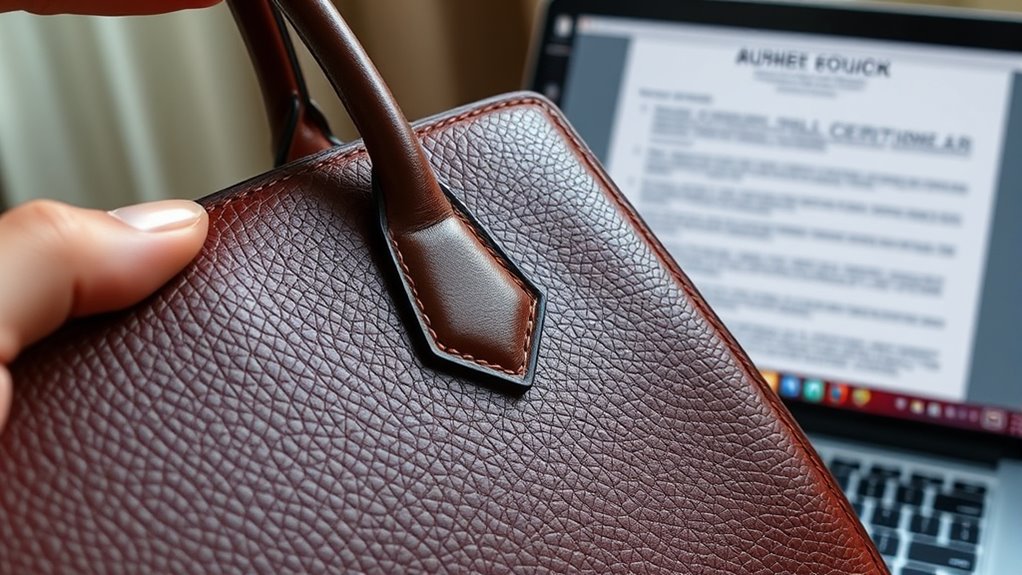
How can you guarantee the designer bags you resell are authentic? You should implement thorough authentication processes, such as expert inspections or verified authentication services, to confirm a bag’s legitimacy. Document each step of your verification to protect yourself legally and to reassure buyers. Be transparent by including legal disclaimers that clarify your role as a reseller and that you rely on authentication results, not guarantees. These disclaimers help limit your liability if a counterfeit slips through, but they don’t absolve you entirely. Proper authentication reduces legal risks associated with selling counterfeit goods and ensures compliance with trademark laws. Staying informed about authentication standards and clearly communicating your verification efforts can help maintain trust and avoid potential legal disputes.
The Role of Original Packaging and Accessories

Original packaging and accessories play a crucial role in verifying a designer bag’s authenticity and increasing its resale value. They serve as proof of luxury branding and adherence to packaging standards, which collectors and buyers highly value. When reselling, ensure the original dust bag, authenticity cards, receipts, and branded tissue paper are intact and in good condition. Visualize a sleek box with crisp logos, tissue wrapping with embossed logos, and sturdy dust bags that feel luxurious to the touch. These elements confirm the bag’s provenance and elevate its desirability. Without original packaging, your listing may seem incomplete, reducing its perceived value. Maintaining these accessories not only supports authenticity but also helps justify a higher resale price, appealing to discerning buyers who prioritize genuine luxury branding. Additionally, collectible packaging can significantly boost the perceived rarity and desirability of the item. Being aware of brand packaging standards ensures you recognize genuine items and avoid counterfeits, further safeguarding your investment. Proper packaging also plays a key role in preventing damage during transit, ensuring the item remains in pristine condition for resale.
Platform Policies and Seller Agreements
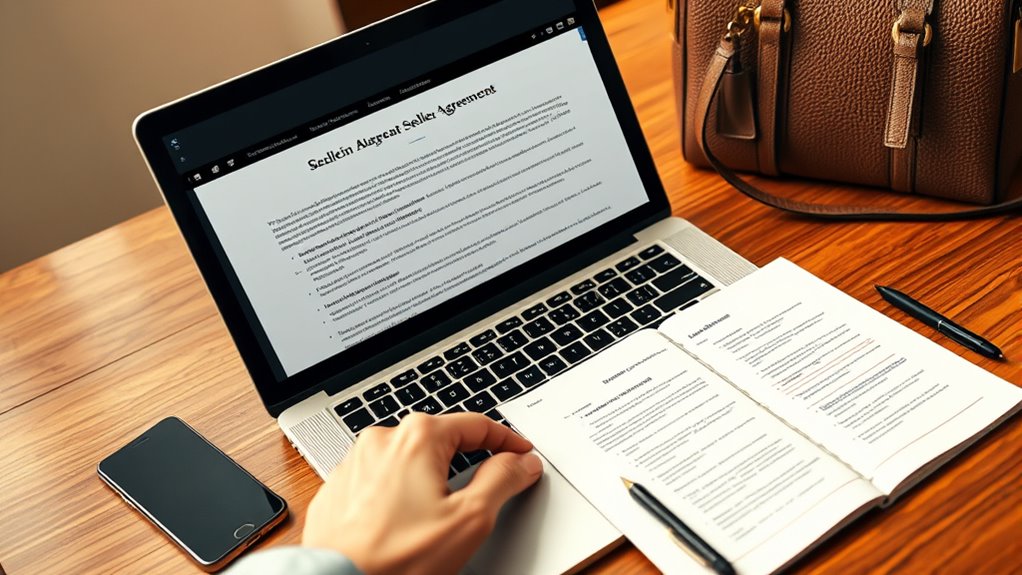
Understanding platform policies and seller agreements is essential before you start reselling designer bags online. These rules govern how you list, price, and sell your items on various online marketplaces. They often specify acceptable product conditions, authenticity verification, and prohibited practices that could harm your reputation. Failing to comply can lead to account suspension or bans, damaging your brand reputation and limiting future sales. Carefully review each platform’s seller agreement to ensure your listings align with their standards. Some marketplaces may have restrictions on reselling certain brands or require proof of authenticity. By understanding and adhering to these policies, you protect your business, maintain a trustworthy reputation, and avoid legal complications. Staying informed helps you navigate online marketplaces smoothly and build a sustainable reselling operation, especially considering the importance of platform compliance in maintaining good standing. Moreover, understanding wall organization systems can help you create a professional and appealing storefront, attracting more customers and boosting your sales. Additionally, being aware of brand authenticity requirements is crucial to avoid counterfeit issues and ensure customer trust.
Consumer Protection Laws and Fair Trading Practices

Are you aware of the consumer protection laws and fair trading practices that govern online reselling? These regulations ensure you’re honest with your customers and maintain transparency. For example, your pricing strategies should reflect fair market value, avoiding misleading or inflated prices. Customer reviews play a vital role—they build trust and let buyers see real experiences. Remember, laws require you to provide clear product descriptions, including condition and authenticity. You must avoid deceptive practices like false advertising or hiding important details. When you follow fair trading practices, you foster loyalty and reduce legal risks. Additionally, understanding regulatory compliance is crucial to ensure your business adheres to evolving legal standards, much like choosing the right fake fireplace to enhance your space legally and safely. Staying informed about market trends helps you adapt to changes and maintain a competitive edge. Just as with electric bikes and other emerging markets, staying informed helps you navigate complex legal landscapes. Visualize your online store as a trustworthy marketplace, where transparent pricing, honest reviews, and straightforward policies attract repeat customers and safeguard your reputation.
Intellectual Property Infringements and Counterfeit Risks
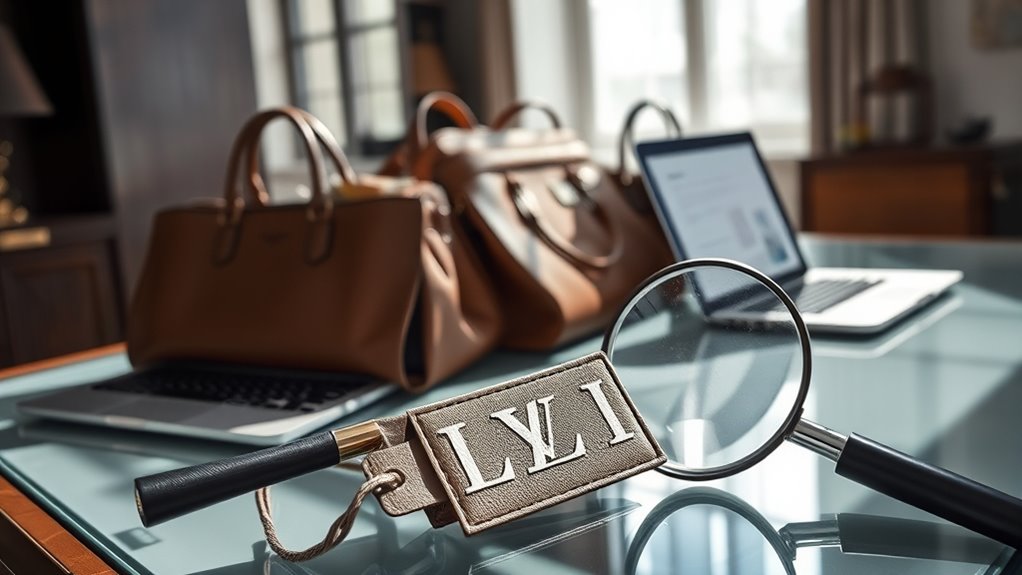
Because counterfeit designer bags flood the online marketplace, understanding intellectual property laws that protect brand trademarks and designs is essential. Trademark disputes can arise if you sell bags that infringe on a brand’s registered marks, risking legal action and damage to your reputation. Counterfeit prevention is critical to avoid unknowingly selling fake products, which can lead to hefty fines and legal consequences. To protect yourself, verify the authenticity of the bags you resell and stay informed about trademark rights. Be cautious of listings that seem too good to be true or lack proper documentation. By respecting intellectual property rights and implementing strict counterfeit prevention measures, you reduce your risk of infringing on trademarks and facing costly legal disputes.
Taxation and Business Licensing Requirements
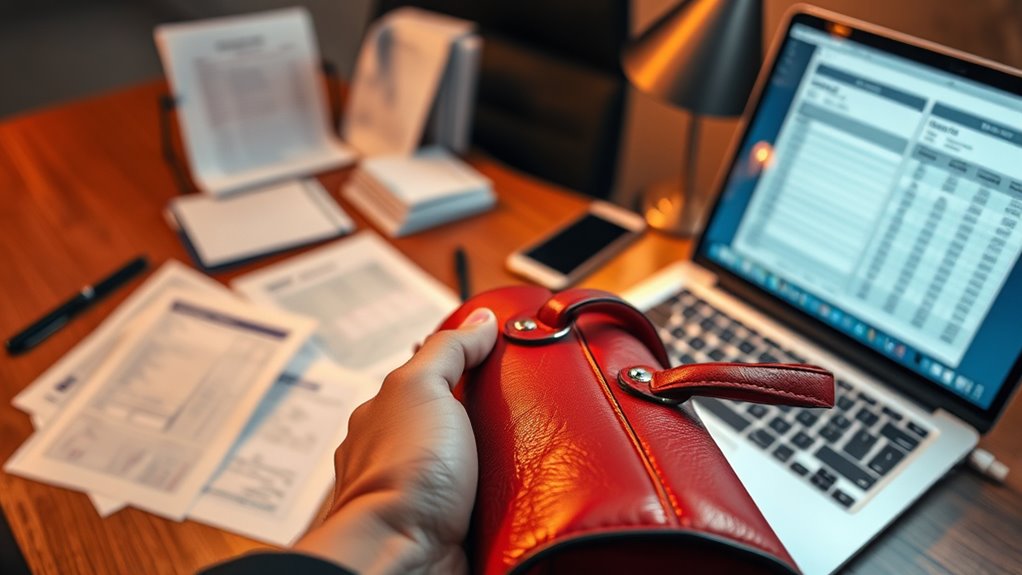
Selling designer bags online requires more than just sourcing authentic products; it also involves complying with tax laws and obtaining the necessary business licenses. You need to register your business, collect sales tax, and stay updated on local regulations to avoid penalties. Proper licensing ensures your operations are legitimate and helps protect your brand valuation amid increasing market saturation. Failing to meet these requirements can lead to fines or even suspension of your online store. Additionally, maintaining accurate inventory records and a website compliant with legal standards is crucial. Implementing proper storage practices for your inventory further safeguards your business from potential issues. Ensuring your operations follow local regulations can prevent costly legal complications. Staying informed about industry standards and compliance is essential for long-term success. Visualize a well-structured setup: a dedicated workspace, clear tax documentation, licensed permits displayed prominently, and compliance with taxation and licensing regulations. Staying on top of these requirements keeps your reselling business sustainable and competitive in a crowded market.
International Reselling Considerations
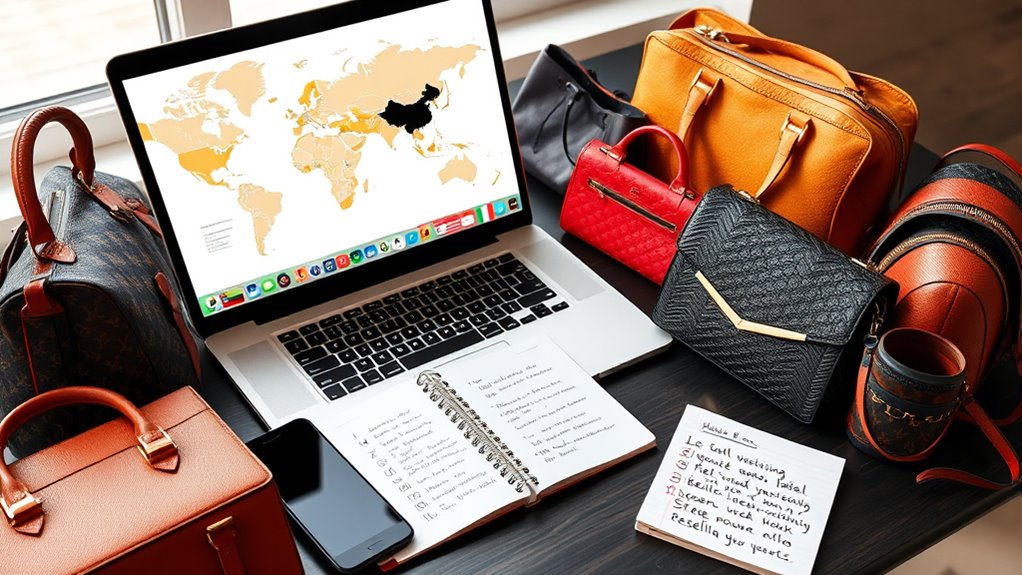
When reselling designer bags internationally, you need to understand customs and import regulations to avoid delays or extra charges. You also have to stay compliant with taxation and duty requirements in each country you ship to. You should familiarize yourself with customs duties and tariffs to better estimate costs and avoid unexpected fees. Being aware of these rules helps you manage costs and guarantee smooth transactions across borders. Additionally, understanding divorce requirements in different states can be useful if you encounter legal issues related to the sale or ownership of goods in various jurisdictions.
Customs and Import Regulations
Managing customs and import regulations is crucial when reselling designer bags internationally, as each country has its own rules and tariffs that can impact your profits and shipping process. You need to understand customs procedures to guarantee smooth delivery, avoid delays, and prevent unexpected costs. Import tariffs vary widely and can markedly affect your pricing strategy. You might encounter:
- Customs forms that detail your shipment’s contents
- Restrictions on luxury items and branded goods
- Variable import duties based on product value
- Quarantine or inspection requirements
- Documentation needed for legal clearance
- Staying updated on import regulation changes helps you adapt quickly to new policies and avoid compliance issues. Being aware of these factors helps you prepare for potential hurdles, optimize your shipping process, and stay compliant with international trade laws. Proper knowledge of customs and import tariffs safeguards your business and ensures customer satisfaction. Additionally, staying informed about import regulations helps you adapt to changing policies and maintain compliance across different markets. Incorporating customs procedures into your planning can also reduce the risk of delays and fines. Understanding international trade laws is essential for navigating complex legal frameworks and avoiding penalties. Integrating cybersecurity awareness into your operations can also protect your sensitive business data during international transactions.
Taxation and Duty Compliance
Understanding taxation and duty requirements is essential for successful international resale of designer bags, as these fees directly impact your costs and profit margins. Accurate knowledge of market valuation helps you determine appropriate pricing strategies that account for customs duties and taxes, ensuring your listings remain competitive while covering additional expenses. Failing to comply with duty regulations can lead to fines, delays, or confiscation of goods, which harm your reputation. By researching each country’s import policies, you can avoid unexpected costs and set transparent prices for your customers. Incorporating duties and taxes into your pricing strategies allows you to maintain healthy profit margins and provide clear information to buyers. Staying compliant minimizes legal risks and helps establish your credibility in the global marketplace.
Best Practices for Staying Legally Compliant

To stay legally compliant while reselling designer bags online, you need to familiarize yourself with intellectual property laws and guarantee you have the right to sell each item. This means verifying authenticity, avoiding counterfeit goods, and understanding licensing restrictions. To protect yourself, keep detailed records of receipts and provenance. Focus on transparent pricing strategies that reflect fair market value and avoid misleading customers. Excellent customer service is also essential—respond promptly to inquiries and clearly communicate product details. Visualize maintaining a professional storefront, double-checking authenticity certificates, and staying updated on legal changes. These practices help you prevent legal issues, build trust, and sustain your business long-term. Remember, staying informed and diligent keeps your reselling efforts both profitable and compliant.
Frequently Asked Questions
Can I Resell Designer Bags Without Original Receipts?
You can resell designer bags without original receipts, but it might complicate authenticity verification and resale value assessment. Without receipts, buyers may question the bag’s authenticity, affecting your sale price. To guarantee a smooth resale, provide clear photos, proof of purchase if possible, and detailed descriptions. This helps establish trust and authenticity, even without receipts, making your resale process more successful and protected.
Are There Specific Licenses Required for Online Resale Businesses?
Think of starting your online resale venture as planting a seed—you’ll need the right tools to help it grow. Resale licensing is your key to ensuring legal growth, as it meets online business regulations and keeps you on the right side of the law. Check your local rules, because some places require specific licenses for resale businesses, turning your passion into a legitimate enterprise with a solid foundation.
How Do Customs Laws Affect International Reselling?
When you resell designer bags internationally, customs laws substantially impact your business. You need to understand import/export regulations, as they dictate what you can send across borders. Duty taxes may apply, increasing your costs and affecting your pricing. Failing to comply can lead to delays, fines, or confiscation of your shipments. Stay informed about these laws to guarantee smooth international reselling and avoid legal issues.
What Are the Penalties for Selling Counterfeit Designer Bags?
Ever wondered what happens if you sell counterfeit designer bags? The penalties are serious; you could face hefty fines, confiscation of goods, or even criminal charges. Counterfeit implications include damaging your reputation and risking trademark infringement lawsuits. Are you willing to jeopardize your future for a quick profit? Staying compliant helps you avoid legal trouble, protecting your business and peace of mind in the long run.
Is It Legal to Modify or Repair Designer Bags Before Resale?
You’re wondering if modifying or repairing designer bags before resale is legal. Generally, repair legality depends on whether the work affects the bag’s authenticity verification. Minor repairs like fixing a zipper or replacing hardware are usually fine, but significant modifications could raise questions about authenticity or violate trademark laws. Always confirm repairs don’t alter key brand features and keep documentation to prove authenticity verification if needed.
Conclusion
Exploring the world of online designer bag reselling might seem tricky, but it’s like finding a hidden treasure map—you just need to follow the clues. By understanding laws, verifying authenticity, and respecting platform rules, you’ll avoid pitfalls and enjoy the thrill of a successful sale. Remember, staying compliant isn’t just about avoiding trouble; it’s about building trust and turning your passion into a legit, rewarding venture. Happy reselling!
